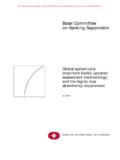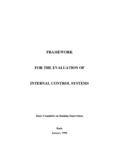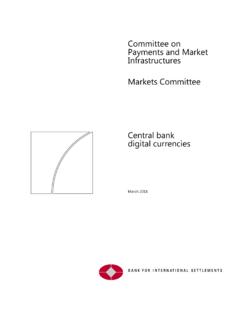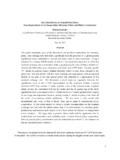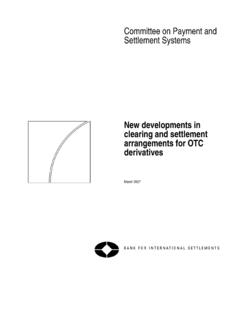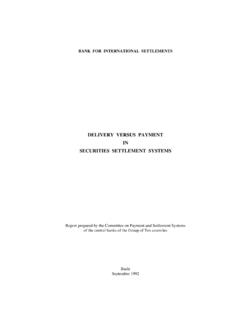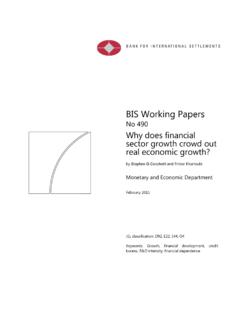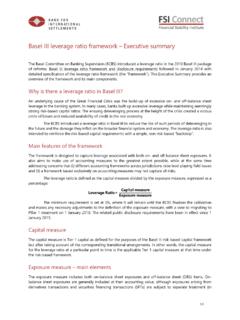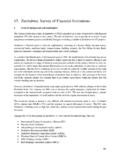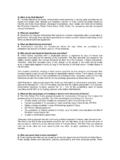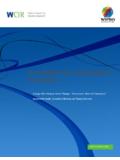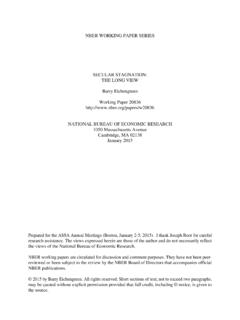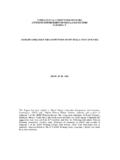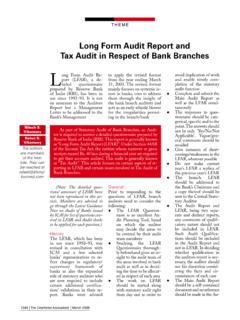Transcription of Davio Oddsson: Review of recent economic and …
1 Dav Oddsson: Review of recent economic and financial developments in Iceland Address by Mr Dav Oddsson, Chairman of the Board of Governors of the central Bank of Iceland, at the Bank's annual meeting, Reykjavik, 30 March 2007. * * * Chairman of the Board of Governors, Prime Minister, Ministers of Government, Ladies and Gentlemen: On behalf of the Board of Governors I welcome you all to this, the 46th annual meeting of the central Bank of Iceland. At the Bank s last annual meeting it was announced that the Government of Iceland and the central Bank had been in consultation on the need to boost the Bank s foreign reserves substantially and also to improve its capital position.
2 Their motivation for doing so was not, however, that either position had weakened, nor that the Bank no longer met the benchmarks for capital and foreign reserves. For a long time the minimum foreign reserve has been set at an amount equivalent to three-months imports, and this level has always been ensured. However, the major changes which could even be called revolutionary that have taken place in Iceland s financial sector over a relatively few years prompted the Board of Governors to regard it as prudent to take other factors into account, such as the size and scope of the financial sector. As far as the capital position is concerned, it can be said that clear guidelines are to be found in recent legislation on the central Bank.
3 The clause in the law dealing with the transfer to the Treasury makes some for provision for whether the Bank s capital has reached a specified minimum relative to the size of the domestic credit system. The central Bank Act states that an amount equal to two-thirds of the central Bank s profit shall be paid annually to the Treasury. However, the Bank pays only one-third of its profit to the Treasury if its capital is equivalent to less than of of the amount of lending and domestic securities in the credit system. At present the Bank s capital is still a long way short of this legal reference level, and its annual profit will not suffice to strengthen it markedly anyway.
4 Growth has not only soared in the Icelandic credit system, but on an increasing scale each year has also been associated with foreign markets, where credit institutions activities have expanded enormously. These changes also give grounds for considering other terms of reference for foreign reserves than import levels alone. As the Prime Minister stated in his speech earlier, the government responded positively to the points raised by central Bank and authorised it to borrow abroad in the name of the Treasury in order to strengthen its foreign reserve substantially, while the government was also mandated by parliament to strengthen the Bank s capital position.
5 The Board of Governors would like to thank the government for such a good, firm response. The foreign loan that the central Bank was authorised to take was its largest on behalf of the Treasury so far. It can only be said that this was a highly successful measure in fact, a respected international financial journal ranked it one of the ten most successful international bond issues worldwide last year. The borrowing terms were very favourable and of course reflected the confidence enjoyed by the Republic of Iceland in the market. The central Bank s greatly enhanced capital position and stronger foreign reserves do not signal any shift in its policy, but represent a natural response to changes in the environment in which the Bank operates.
6 At last year s annual meeting we all had serious concerns about the peculiar discussion and sometimes unfounded speculation aired then about the Icelandic banks, their position and strength. There is no doubt that this debate and the ensuing events made conditions tighter for the banks for a while. The banks responded firmly to the uncomfortable position that had arisen. They made great efforts to explain the structure and organisation of the Icelandic banks. This was no half-hearted measure, but a steadfast and confident approach which produced results. The banks adjusted certain aspects of their operations and operating environment in response to relevant criticisms, and dismissed what was less relevant with explanations, reports and candid communication, at large meetings, small meetings and man-to-man, depending upon which was most productive.
7 They needed temporarily to look beyond their traditional markets for funding, and unquestionably these conditions put their resources and management under strain. It can definitely be said that those involved passed this difficult test. The funding problem that loomed around this time a year ago is a thing of the past, terms in the secondary market have been normalised and market confidence has been restored. This BIS Review 34/2007 1 is to be welcomed. What remains, however, is of course that people are now more aware of the widespread risks that the future may hold in store. Global market conditions can change suddenly. Credit access, which in recent times has been exceptionally favourable for Icelandic and other banks, may change suddenly if unexpected conditions arise.
8 It is important to be prepared for such a contingency. At the height of this furore, I would venture to say that the central Bank made a strong contribution with its financial Stability report, which was deemed to be professional, candid and in line with international best practice. The Bank s next financial Stability report will be published towards the end of April. Although these were not enviable times for financial companies, they definitely learned a lesson from this ordeal and are both more cautious and more aware of external influences than before. Rapid and sweeping changes in the financial sector put a great strain on regulatory agencies, which may face an uphill struggle to keep up with the swift pace of developments.
9 The same may undoubtedly be said about the central Bank. After all, useful and supportive as these institutions may be, they neither can nor should play a leading role. That role can only be performed by the financial companies themselves. Because they rely so heavily on open access to credit markets, it is crucial for them to enjoy the confidence of their creditors. In this respect like many others, credibility is a fragile thing and a very high price can be paid for losing it. Turbulence in global markets is sure to continue. Naturally people try to read the signs and foresee the most important parameters, in order to adapt to them in good time or respond sensibly.
10 Important as it is to keep a close watch on developments and changes in global markets, what matters most of all is to be strong and well-positioned enough to withstand the most unexpected shocks. Global liquidity has been exceptionally abundant in recent years, and has been widely tapped on good terms. The benefits of resourcefulness and bold, quick action can be realised to the full in such circumstances. It is impossible to rule out that such a climate will persist for a long while, but this is by no means certain. And when a change does take place, it may be caused by unexpected circumstances and strike quickly. It is then that caution and prudence prove most effective.
